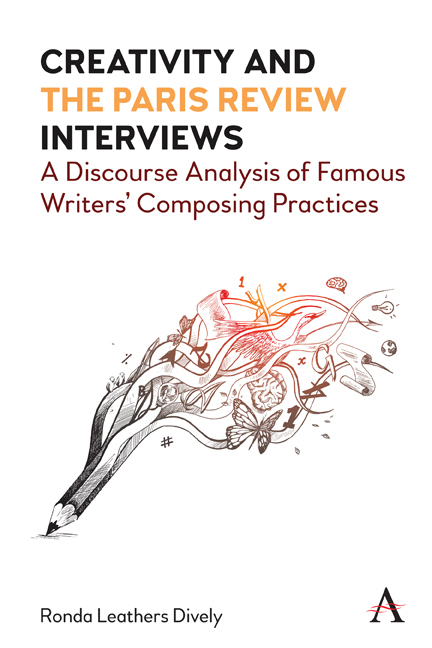 Creativity and 'the Paris Review' Interviews
Creativity and 'the Paris Review' Interviews Book contents
- Frontmatter
- Contents
- List of Illustrations
- Preface
- Acknowledgments
- 1 Impetus, Contexts and Methods
- 2 Composition through the Lens of Creativity Theory
- 3 First Insight, or the Glimmer of Possibility
- 4 Preparation, or Research Broadly Conceived
- 5 Incubation, or Breaks from Conscious Attention
- 6 Insight, or the Eureka Experience
- 7 Verification, or Evaluation
- 8 Emergent Patterns
- 9 Implications for Writing Instruction
- Appendix A Coding Table
- Appendix B List of Cited Paris Review Interviewees
- Appendix C Diagram of Analytical Categories, Subcategories and Themes
- References
- Index
6 - Insight, or the Eureka Experience
Published online by Cambridge University Press: 27 April 2022
- Frontmatter
- Contents
- List of Illustrations
- Preface
- Acknowledgments
- 1 Impetus, Contexts and Methods
- 2 Composition through the Lens of Creativity Theory
- 3 First Insight, or the Glimmer of Possibility
- 4 Preparation, or Research Broadly Conceived
- 5 Incubation, or Breaks from Conscious Attention
- 6 Insight, or the Eureka Experience
- 7 Verification, or Evaluation
- 8 Emergent Patterns
- 9 Implications for Writing Instruction
- Appendix A Coding Table
- Appendix B List of Cited Paris Review Interviewees
- Appendix C Diagram of Analytical Categories, Subcategories and Themes
- References
- Index
Summary
The Eureka experience, the Aha! moment, the incubation effect—all are synonyms for insight, the fourth element of the paradigmatic creative process model introduced in Chapters 1 and 2 as the emergence of a solution to a creative problem. As Chapters 3, 4 and 5 collectively indicate, insight typically follows upon considerable labor and frustration associated with defining the parameters of a particular challenge, gathering background information essential to undertaking it, managing the stress of mental blocks, as well as locating and applying strategies for breaking through them. In response to all the effort and vexation, insight is an exhilarating reward that keeps creators engaged with their work despite the intense cognitive, emotional and physical endurance it requires.
Relevant to writing, insight is most reasonably linked with drafting. In other words, the solution to a creative problem reveals itself in the execution of a concept or plan for a literary work in the form of easily and smoothly expressed phrases, sentences, paragraphs and even larger sections of text, accompanied by a feeling that the draft in progress is an apt realization of that concept or plan. These circumstances often result in a state of “flow,” defined in Chapter 2 as “an almost automatic, effortless, yet highly focused state of consciousness” in the midst of “painful, risky, difficult activities that stretch [personal] capacity and [involve] an element of novelty and discovery.” This definition is worth repeating here since it previews the vast majority of references to insight in The Paris Review (PR) interviews sampled for this study as will become clear in the remainder of this chapter. References coded as insight total 136 and fall into four subcategories that clarify how the interview subjects experience insight: effortless drafting, autonomous literary elements, discovery writing and sudden connections. Each of these subcategories contains passages that communicate a sense of how Eureka moments feel and/or how they come to be.
Special difficulties in coding this element of the creative process model involved distinguishing it from first insight. Readers will recall that first insight is the initial vision for a project, usually a vague and underdeveloped notion merely suggestive of a direction or final destination.
- Type
- Chapter
- Information
- Creativity and 'the Paris Review' InterviewsA Discourse Analysis of Famous Writers' Composing Practices, pp. 89 - 102Publisher: Anthem PressPrint publication year: 2022


